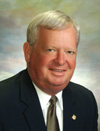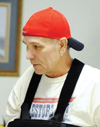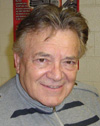
Bill Carpenter NODAWAY VALLEY BANK, ST. JOSEPH
Some people love what they do, and will until they retire. Compared to Bill Carpenter, what they have isn’t love, it’s middle-school infatuation. At 71 years old, Carpenter still shows up for work every day at Nodaway Valley Bank’s office in St. Joseph, just as he’s done for the past 17 years. “I just love it,” says Carpenter, the vice chairman. “I love the people, although, at this age, it’s like working with your kids, mostly.”
After 25 years with Commerce Bank, Carpenter joined Nodaway Valley, in which Maryville’s Robinson family has had ownership interest for five generations, dating to 1873. Nodaway Valley, he said, reflects the conservative fiscal approach that is a hallmark of community banking in Missouri. Overall, he says, Missouri’s banking infrastructure is sound. “Community banking organizations have done a good job,” Carpenter says. “There are spots where people got a little aggressive for one reason or other, but for the most part, the community banking effort—and the bigger banks like Commerce, UMB and US Bank—I think the system is very good.”
A native of Mendon, Mo., in Chariton County, Carpenter graduated from the University of Missouri in 1964, and is a self-described “rabid Mizzou fan.” He and Sally, his wife of 45 years have raised four children and have eight grandchildren.

Mark Lindquist COMMUNITY SUPPORT SERVICES, JOPLIN
Mark Lindquist risked his life to do the right thing, and he’s been paying for it ever since. He made national headlines last year for the heroism he displayed by trying to save three developmentally disabled patients as the May 22 tornado bore down on their facility in Joplin. Their group home exploded around them, making survival a matter of the fates.
The residents he tried to save were among the 162 who died, and Lindquist himself, buried in rubble, was so badly injured that he would spend weeks in hospital settings before he could walk under his own power.
What happened after that made Lindquist a hero again, at least in the minds of those who were injured while at their jobs when the tornado hit. With his medical bills soaring past $2.5 million, Lindquist learned last summer that the company providing worker’s compensation insurance for the group home’s operator, Community Health Services, had denied his claim for coverage of medical treatment. Reason? He wasn’t subject to any danger that the public at large wasn’t.
That may have been sound judgment from a legal perspective, but it proved astonishingly tone-deaf from a PR standpoint. When you have Republican lawmakers taking umbrage at overzealous applications of the profit motive—as with state Rep. Bill Lant of Joplin—you know you have problems.
Lindquist’s sister, Linda Baldwin, also went to work on his behalf, and just days after Lindquist’s plight made national news, the insurer reversed itself.
“A lot of workers got worker’s compensation because Mark got it,” Baldwin said. “A lot of needy people benefited.”

Rosie Privitera Biondo MARK ONE ELECTRIC, KANSAS CITY
The more members there are, the greater the complexity of running a family-owned business. But Rosana Privitera Biondo, president of Mark One Electric in Kansas City, can tell you what’s needed to navigate that maze.
“We have a solid family nucleus,” she says. “Each of us is different, but we complement each other. We’ve positioned ourselves into areas where we all have our own expertise, but we always rely on each other for advice.” Her three brothers join her on the executive team of the company founded in 1974 by their father, Carl Privitera, and all three learned the business from the ground up. With more than 200 employees, Mark One is among the top electrical contractors in the region, and has worked on projects that define Kansas City’s skyline. Biondo also sports a lengthy resume of civic and charitable service, including a stretch as national chair for the Business Owners Council of the National Association of Women in Construction.
And with nine Privatera-Biondo grandchildren, a third generation will likely end up running the show in the years to come. “I will forever treasure the time I spent working with my dad,” says Biondo, “and I hope my son, nieces and nephews will have memories like that, too. We’re really building a legacy.”

Charles Heizer HEIZER AEROSPACE, PEVELY
Charles Heizer became a Missourian just like he became an entrepreneur—the hard way. Charlie, as he is known by his family, employees and business associates, is the founder of Heizer Aerospace in Pevely, near St Louis. He took an indirect path to business ownership, starting from his native Hungary during the Cold War. And even before that, with Europe in ruins during World War II, he would help his father, a blacksmith, make lighters out of shell casings and trade them for life necessities, or turn the hulks of abandoned military equipment into farm implements. That’s where his value system came from. After the Hungarian revolt of 1956, he made his way to America and settled in the heart of it. His ventures since then have been in aerospace, medical and small-arms technologies, building his aerospace company from the basement of his home in south St Louis into modern industrial plants. Heizer likes to spend quality time with his family at the Lake of the Ozarks, paticularly when he can take his grandchildren fishing and boating there. A man whose life was shaped by the flight from Soviet imperialism has a world view reflected in the history segment of his company’s Web site, which greets visitors with George Santayana’s dire warning: “Those who cannot remember the past are condemned to repeat it.”